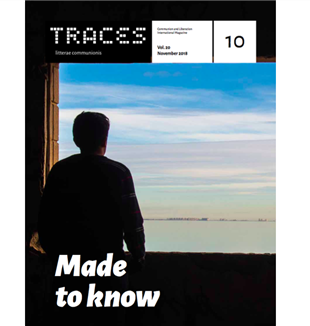
In this Issue of "Traces"
An overview and a short reflection on the contents of the November 2018 issue of Traces, "Made to Know."The editorial page in this month’s edition of Traces states, “In order to know, data, analyses, and theories do not suffice.” In these pages you will read about Lourdes, a woman from Tenerife, Spain, who in doing charitable work for Belen, a woman whose partners—as well as whose drug problem—come and go, understood that the key to the relationship with her was “not to judge,” but to “consider her destiny… with an infinite tenderness.” The letter opened a wound in me, because my first reaction to it was that of being unnerved, especially thinking of Belen’s son, Oscar, who struggles with the men in his mother’s life because he is searching for a father figure, and who has begun to exhibit signs of violence and aggression over it. You see Belen’s confusion, you think of Oscar’s wounds, and you want to put it all in place, correct her mistakes, heal his need. Reading the letter on another side of the world in Washington, D.C., although you haven’t seen Oscar’s or Belen’s faces, you feel your own mistakes, feel the son in you who’s looking for the perennial father, and it hits you that your comfortable life, your satisfying job, your having everything you need makes you no different from Belen and Oscar, even though you are not a woman or man with different partners, a son watching his mother go through hers. Why is it then, that you feel these problems as if they were your own? Lourdes and her husband have dinner with Belen, who writes a thank you note that says, “You make me feel like myself, more a person.”
Lourdes’ letter is one among the many things this issue of Traces, which covers stories from places as disparate as California, where a mechanical engineer, Mauro Prina, witnesses his understanding of how limiting knowledge to what he already thinks leads to nothing, and Kenya, where in The Little Prince Primary School, children in the Nairobi slums act out parts of The Divine Comedy. Through these stories, you see that the problem of life is sitting down to dinner with someone because we have recognized Someone who has sat down to dinner, and continues to do so, with us; that the problem of our lives and in the lives of those around us does not cry out so much for solutions as much as for this Other who lies at the bottom of everything, because any problem, any situation, is a reflection of the cry within us for the meaning of every problem, every thing.